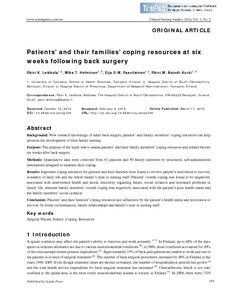Patients' and their families' coping resources at six weeks following back surgery
Leikkola, Päivi; Helminen, Mika; Paavilainen, Eija; Åsted-Kurki, Päivi (2014)
Leikkola, Päivi
Helminen, Mika
Paavilainen, Eija
Åsted-Kurki, Päivi
2014
Clinical Nursing Studies 2 2
105-117
Terveystieteiden yksikkö - School of Health Sciences
CC BY 3.0
Julkaisun pysyvä osoite on
https://urn.fi/URN:NBN:fi:uta-201609262341
https://urn.fi/URN:NBN:fi:uta-201609262341
Tiivistelmä
Background: New research knowledge of adult back surgery patients’ and family members’ coping resources can help promote the development of their family nursing.
Purpose: The purpose of the study was to assess patients’ and their family members’ coping resources and related factors six weeks after back surgery.
Methods: Quantitative data were collected from 61 patients and 50 family members by structured, self-administered instruments designed to measure their coping.
Results: Important coping resources for patients and their families were found to involve patient’s motivation to recover, normalcy of daily life and the whole family’s trust in nursing staff. Patients’ overall coping was found to be negatively associated with deteriorated health and mood, insecurity regarding future, social isolation and increased problems in family life, whereas family members’ overall coping was negatively associated with the patient’s poor health status and the family members’ social isolation.
Conclusion: Patients’ and their families’ coping resources are influenced by the patient’s health status and motivation to recover, by home circumstances, family relationships and family’s trust in nursing staff.
Purpose: The purpose of the study was to assess patients’ and their family members’ coping resources and related factors six weeks after back surgery.
Methods: Quantitative data were collected from 61 patients and 50 family members by structured, self-administered instruments designed to measure their coping.
Results: Important coping resources for patients and their families were found to involve patient’s motivation to recover, normalcy of daily life and the whole family’s trust in nursing staff. Patients’ overall coping was found to be negatively associated with deteriorated health and mood, insecurity regarding future, social isolation and increased problems in family life, whereas family members’ overall coping was negatively associated with the patient’s poor health status and the family members’ social isolation.
Conclusion: Patients’ and their families’ coping resources are influenced by the patient’s health status and motivation to recover, by home circumstances, family relationships and family’s trust in nursing staff.
Kokoelmat
- Artikkelit [6140]
